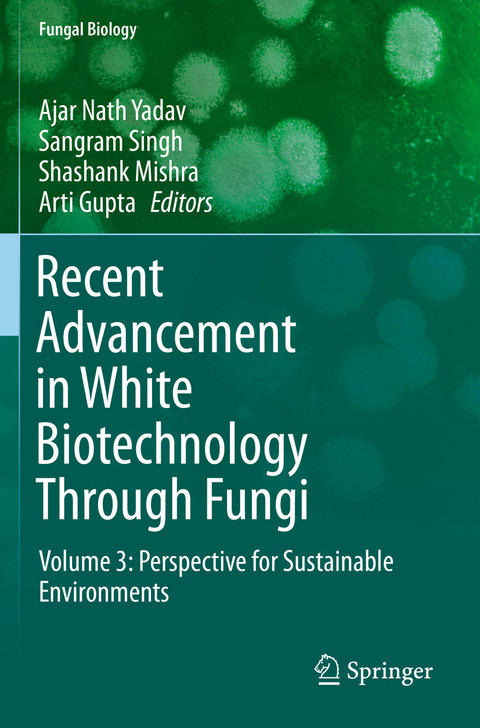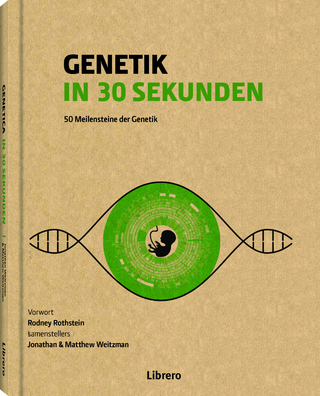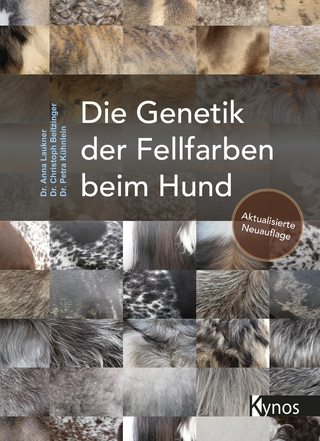
Recent Advancement in White Biotechnology Through Fungi
Springer International Publishing (Verlag)
978-3-030-25508-4 (ISBN)
Over the last decade considerable progress has been made in white biotechnology research and further major scientific and technological breakthroughs are expected in the future. The first large-scale industrial applications of modern biotechnology have been in the areas of food and animal feed production (agricultural/green biotechnology) and in pharmaceuticals (medical/red biotechnology). In contrast, the productions of bioactive compounds through fermentation or enzymatic conversion are known as industrial or white biotchnology. The fungi are ubiquitous in nature and have been sorted out from different habitats, including extreme environments (high temperature, low temperature, salinity and pH); and associated with plants (Epiphytic, Endophytic and Rhizospheric).
The fungal strains are beneficial as well as harmful for human beings. The beneficial fungal strains may play important roles in the agricultural, industrial, and medical sectors. The fungal strains and itsproduct (enzymes, bioactive compounds, and secondary metabolites) are very useful for industry (e.g., the discovery of penicillin from Penicillium chrysogenum). This discovery was a milestone in the development of white biotechnology as the industrial production of penicillin and antibiotics using fungi moved industrial biotechnology into the modern era, transforming it into a global industrial technology. Since then, white biotechnology has steadily developed and now plays a key role in several industrial sectors providing both high value nutraceutical and pharmaceutical products. The fungal strains and bioactive compounds also play an important role in environmental cleaning. This volume covers the latest research developments related to value-added products in white biotechnology through fungi.
lt;b>Ajar Nath Yadav is an Assistant Professor in Department of Biotechnology, Akal College of Agriculture, Eternal University, Baru Sahib, Himachal Pradesh, India. He has 4 years of teaching and 10 years of research experiences in the field of Industrial Biotechnology, Microbial Biotechnology, Microbial Diversity, and Plant-Microbe-Interactions. Dr. Yadav obtained doctorate degree in Microbial Biotechnology, jointly from Indian Agricultural Research Institute, New Delhi and Birla Institute of Technology, Mesra, Ranchi, India; M.Sc. (Biotechnology) from Bundelkhand University and B.Sc. (CBZ) from University of Allahabad, India. Dr. Yadav has 101 publications, which include 37 research papers, 15 review articles, 3 books, 1 book manual, 31 book chapters, 8 popular articles, 7 editorials, 2 technical reports, and 1 patent with h-index 23, i10-index 50, and 1551 citations (Google Scholar). Dr. Yadav has published 105 research communications in different international and national conferences. Dr. Yadav has got ten Best Paper Presentation Awards, one Young Scientist Award (NASI-Swarna Jyanti Purskar) and three certificate of excellence in reviewing awards. Dr. Yadav received "Outstanding Teacher Award" in 6th Annual Convocation 2018 by Eternal University, Baru Sahib, Himachal Pradesh. Dr. Yadav has a long standing interest in teaching at the UG, PG and PhD level and is involved in taking courses in agriculture microbiology, bacteriology, bioprocess engineering and technology, environmental microbiology, industrial microbiology, and microbial biotechnology. Dr. Yadav is currently handling two projects one funded by Department of Environments, Science & Technology (DEST), Shimla entitled "Development of Microbial Consortium as Bio-inoculants for Drought and Low Temperature Growing Crops for Organic Farming in Himachal Pradesh" as Principal Investigator and another funded by HP Council for Science, Technology & Environment (HIMCOSTE) on "Value-added products" as Co-PI. He also worked as an organizing committee member for 7 international conferences/symposia in the related field. Presently he is guiding 02 scholars for PhD degree and 01 for M.Sc. dissertations. In his credit _6700 microbes (Archaea, bacteria and fungi) isolated from diverse sources and _550 potential and efficient microbes deposited at culture collection National Bureau of Agriculturally Important Microorganisms (NBAIM), Mau, India. He has deposited 2386 nucleotide sequences and 03 whole genome sequences (Bacillus thuringiensis AKS47, Arthrobacter agilis L77 and Halolamina pelagica CDK2) and 02 transcriptome to NCBI GenBank databases: in public domain. Dr. Yadav and group have developed method for screening of archaea for phosphorus solubilization for the first time. He has been serving as an editor/editorial board member and reviewer for more than 35 national and international peer-reviewed journals. He has lifetime membership of Association of Microbiologist in India, Indian Science Congress Council, India and National Academy of Sciences, India.
Sangram Singh is an Associate Professor in Department of Biochemistry, Dr. Rammanohar Lohia Avadh University, Faizabad, India, has 11 years of teaching and 14 years of research experiences in field of applied biochemistry. Dr. Singh obtained Ph.D. Biochemistry and M.Sc. Biochemistry from Dr. Rammanohar Lohia Avadh University, Faizabad, India. Dr. Singh has been published 34 National and International research papers; 02 books, 02 book chapter. He has presented 09 papers in different National and International Symposia/ Seminars/ Conferences/ Workshops.
Shashank Mishra is presently working as Scientist 'C', Biotech Park, Lucknow, Uttar Pradesh, India. He obtained his doctorate degree in Science "Industrial Biotechnology" in 2015, from Birla Institute of Technology, Mesra, Ranchi, India; M.Phil. (Biotechnology) in 2008 from Alagappa University, Tami
Preface.- Bioremediation: New Prospects for Environmental Cleaning by Fungal Enzymes.- Fungal Enzyme System for Saccharification of Lignocellulosic Feedstocks.- White-Rot Fungi and Their Enzymes for the Treatment of Industrial Dye Effluents.- Fungal Secretomes: Biodegradation Lignocelluloses and Biopolymers.- Fungal Enzymes for Bioremediation of Xenobiotic Compounds.- Pleurotus ostreatus: a Biofactory for Lignin Degrading Enzymes of Diverse Industrial Applications.- Extracellular Fungal Peroxidases and Laccases for Waste Treatment.- Fungal Enzymes for Bioremediation of Contaminated Soil.- Fungal Enzymes for Bioconversion of Lignocellulosic Biomass.- Industrially Important Pigments from Different Groups of Fungi.- Bioconversion of Biomass to Biofuel using Fungal Consortium.- Bioremediation of Polycyclic Aromatic Hydrocarbons Contaminated Soil Through Fungal Community.- Role of Fungi in Climate Change Abatement and Nitrogen Supplement.- Fungal-Phytoremediation of heavy metal contaminated land and water resources.- Biotechnological Applications of beta-Glucosidases in Biomass Degradation.- Genetic diversity of methylotrophic yeast and their impact to the environment.- Microbial enzymes and its Application in Pulp and Paper Industry.- Appendixes.- Index.
| Erscheinungsdatum | 15.10.2020 |
|---|---|
| Reihe/Serie | Fungal Biology |
| Zusatzinfo | XXVII, 511 p. 100 illus., 57 illus. in color. |
| Verlagsort | Cham |
| Sprache | englisch |
| Maße | 155 x 235 mm |
| Gewicht | 819 g |
| Themenwelt | Naturwissenschaften ► Biologie ► Genetik / Molekularbiologie |
| Naturwissenschaften ► Biologie ► Mikrobiologie / Immunologie | |
| Naturwissenschaften ► Biologie ► Mykologie | |
| Schlagworte | Antibiotics • Bioactive Compounds • Bioresources • Food Processing • hydrolytic enzymes • systematic botany • white biotechnology |
| ISBN-10 | 3-030-25508-5 / 3030255085 |
| ISBN-13 | 978-3-030-25508-4 / 9783030255084 |
| Zustand | Neuware |
| Haben Sie eine Frage zum Produkt? |
aus dem Bereich


